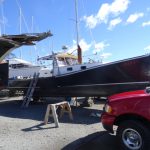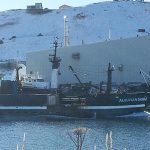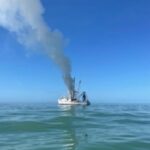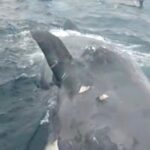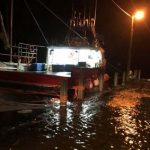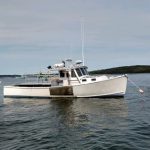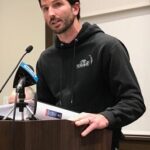Daily Archives: October 24, 2016
KAELIN: Fisheries commission should increase menhaden quota
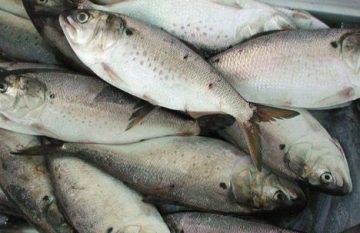 When Thanksgiving rolls around this year, the Atlantic States Marine Fisheries Commission may give New Jersey’s fishermen something to be thankful for. At its meeting Wednesday, the ASMFC will be voting on whether to increase the number of menhaden fishermen can catch each year. By voting in favor of a quota increase, which is strongly supported by the science New Jersey’s commission representatives can improve local economies and bolster the bottom line of hard-working fishermen during the summer and fall seasons while maintaining a balanced ocean ecosystem. After the release of a periodic stock assessment in 2012, the ASMFC incorrectly concluded the stock was threatened. The commission followed that assessment with a significant cut in the amount of menhaden New Jersey fishermen were allowed to catch — a cut of more than 50 percent that remains in effect today, much to the detriment of New Jersey fishing businesses. Read the story here 19:57
When Thanksgiving rolls around this year, the Atlantic States Marine Fisheries Commission may give New Jersey’s fishermen something to be thankful for. At its meeting Wednesday, the ASMFC will be voting on whether to increase the number of menhaden fishermen can catch each year. By voting in favor of a quota increase, which is strongly supported by the science New Jersey’s commission representatives can improve local economies and bolster the bottom line of hard-working fishermen during the summer and fall seasons while maintaining a balanced ocean ecosystem. After the release of a periodic stock assessment in 2012, the ASMFC incorrectly concluded the stock was threatened. The commission followed that assessment with a significant cut in the amount of menhaden New Jersey fishermen were allowed to catch — a cut of more than 50 percent that remains in effect today, much to the detriment of New Jersey fishing businesses. Read the story here 19:57
Latest report says menhaden thriving in the Gulf
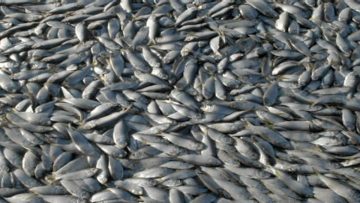 A commission that assesses the health and viability of the menhaden population in the Gulf released a report this week that says despite massive commercial hauls, the menhaden population is sound. It’s called a stock assessment for menhaden — a fish caught for catfood and fish oil supplements and a favorite food of large game fish. If fact, there’s been controversy this year over how many redfish commercial menhaden boats in the Gulf should be allowed to keep in the bycatch while fishing for menhaden. Gulf States Marine Fisheries Commission evaluated the status of the Gulf menhaden in U.S. waters and concluded the “Gulf of Mexico’s menhaden stock is not experiencing overfishing,” said Steven J. VanderKooy, a fisheries coordinator with the commission, which has an Ocean Springs office. Read the story here 19:42
A commission that assesses the health and viability of the menhaden population in the Gulf released a report this week that says despite massive commercial hauls, the menhaden population is sound. It’s called a stock assessment for menhaden — a fish caught for catfood and fish oil supplements and a favorite food of large game fish. If fact, there’s been controversy this year over how many redfish commercial menhaden boats in the Gulf should be allowed to keep in the bycatch while fishing for menhaden. Gulf States Marine Fisheries Commission evaluated the status of the Gulf menhaden in U.S. waters and concluded the “Gulf of Mexico’s menhaden stock is not experiencing overfishing,” said Steven J. VanderKooy, a fisheries coordinator with the commission, which has an Ocean Springs office. Read the story here 19:42
Taranaki fisherman slams government data on Maui’s dolphin
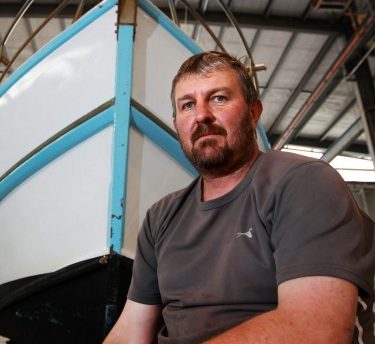 A commercial fisherman in Taranaki has rubbished new government data which shows increased Maui’s dolphin numbers. The research – conducted by the Department of Conservation and the Ministry of Primary Industries – found there are approximately 63 adults left in the species whereas there was previously thought to have been only 55. New Plymouth fisherman Rob Ansley said claims by minister Nathan Guy that set net restrictions were having a positive effect on Maui’s numbers was “a load of s**t”. Ansley said government observers aboard fishing boats in Taranaki waters had not seen a single Maui’s dolphin since they started observing in 2012. “How can it be working if no one has ever had a confirmed sighting of these dolphins,” he said. According to the Department of Conservation the last confirmed sighting of a Maui’s dolphin in Taranaki was at Port Taranaki on January 18, 2014 while the last sighting in New Zealand was on March 20, 2016 off Muriwai beach in Auckland. Read the story here 15:28
A commercial fisherman in Taranaki has rubbished new government data which shows increased Maui’s dolphin numbers. The research – conducted by the Department of Conservation and the Ministry of Primary Industries – found there are approximately 63 adults left in the species whereas there was previously thought to have been only 55. New Plymouth fisherman Rob Ansley said claims by minister Nathan Guy that set net restrictions were having a positive effect on Maui’s numbers was “a load of s**t”. Ansley said government observers aboard fishing boats in Taranaki waters had not seen a single Maui’s dolphin since they started observing in 2012. “How can it be working if no one has ever had a confirmed sighting of these dolphins,” he said. According to the Department of Conservation the last confirmed sighting of a Maui’s dolphin in Taranaki was at Port Taranaki on January 18, 2014 while the last sighting in New Zealand was on March 20, 2016 off Muriwai beach in Auckland. Read the story here 15:28
Fishing chiefs to meet Scottish Government over Brexit
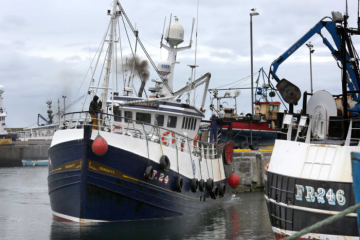 Scottish fishing leaders will hold meetings with key Government representatives this week to promote the opportunities they believe Brexit can deliver for Scotland’s coastal communities. Bertie Armstrong, chief executive of the Scottish Fishermen’s Federation, will give evidence tomorrow to the House of Commons Scottish Affairs Committee in Glasgow to outline how he believes Brexit, if handled properly, could provide the framework for injecting fresh dynamism into Britain’s fishing communities. “But to achieve this, we need our politicians to be fully onside so that fishing is right at the heart of the Brexit process.“We will be telling UK and Scottish Government ministers that it would be unforgivable if fishing was traded away during the negotiations. Read the story here 14:28
Scottish fishing leaders will hold meetings with key Government representatives this week to promote the opportunities they believe Brexit can deliver for Scotland’s coastal communities. Bertie Armstrong, chief executive of the Scottish Fishermen’s Federation, will give evidence tomorrow to the House of Commons Scottish Affairs Committee in Glasgow to outline how he believes Brexit, if handled properly, could provide the framework for injecting fresh dynamism into Britain’s fishing communities. “But to achieve this, we need our politicians to be fully onside so that fishing is right at the heart of the Brexit process.“We will be telling UK and Scottish Government ministers that it would be unforgivable if fishing was traded away during the negotiations. Read the story here 14:28
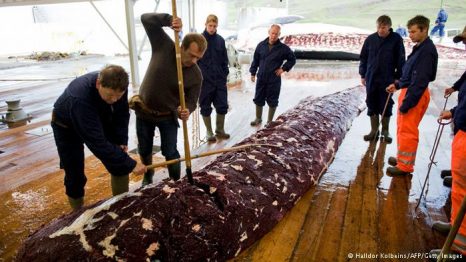
Controversial whale sanctuary to be voted on at the International Whaling Commission
A whale sanctuary in the South Atlantic covering an area as big as India and Russia together: This is the proposal presented by Argentina, Gabon, South Africa, Uruguay and Brazil at the 65th meeting of the International Whaling Commission in Slovenia, which runs from October 20 to 28. A heated debate between some 80 pro- and anti-whaling nations will lead tomorrow (25.10.2016) into voting on whether to give the green light to the proposal, or reject it once again – it happened in 1998. Japan, Iceland and Norway have been the three main countries blocking the sanctuary due – environmentalists say – to their commercial interests. These three nations have used legal loopholes and controversial arguments to keep hunting whales, even in existing sanctuaries. If the new sanctuary proposal is accepted, the immediate question following the hurrahs will be how to really protect whales there from countries that continue to insist on whaling. While the moratorium for commercial hunting from 1985 largely improved the protection of whales, threats such as by-catch or pollution were left out of the agreement. Whale sanctuaries are intended to fill that gap. Read the story here 13:12
Atlantic States Marine Fisheries Commission meeting at Bar Harbor, Maine October 24th-27th – Listen Live
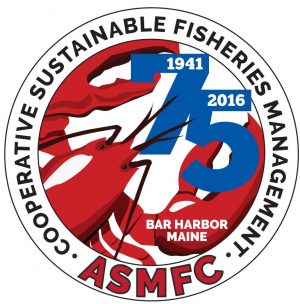 The Atlantic States Marine Fisheries Commission will meet in at the Harborside Hotel 55 West Street Bar Harbor, Maine. The agenda is subject to change. The agenda reflects the current estimate of time required for scheduled Board meetings. The Commission may adjust this agenda in accordance with the actual duration of Board meetings. Interested parties should anticipate Boards starting earlier or later than indicated herein. Click here for details, Click here for webinar 12:10
The Atlantic States Marine Fisheries Commission will meet in at the Harborside Hotel 55 West Street Bar Harbor, Maine. The agenda is subject to change. The agenda reflects the current estimate of time required for scheduled Board meetings. The Commission may adjust this agenda in accordance with the actual duration of Board meetings. Interested parties should anticipate Boards starting earlier or later than indicated herein. Click here for details, Click here for webinar 12:10
‘He bit me’ – Digby lobster fisherman catches strange fish
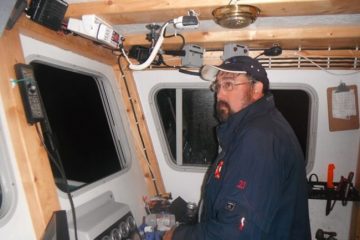 Glen Oliver, first mate on the/Randi & Brianne , was hauling traps in the middle of the Annapolis Basin Oct. 22 when he saw something he’d never seen before. He hollered to captain Ralph Cummings to take a look. In the parlour of the trap, along with a couple lobster, was a fish Cummings had never seen before. “I’ve been fishing for 30 year and I’ve never seen one,” he said. “I took a picture and sent it to Johnny. I knew he could figure it out.” Cummings is used to fish in the traps – it’s not at all unusual to find codfish, sculpins or toadfish in the parlour. But this was different. Cummings had caught a grey triggerfish (Balistes capriscus) about a foot and half long with a deep body, tough leathery scales, eyes set back and high up on the body and a little beak-like mouth. Cummings learned the hard way that inside the little mouth are two rows of sharp teeth. “He bit me. I guess I had my hand too close to his mouth,” he said. Read the story here with two more images 11:41
Glen Oliver, first mate on the/Randi & Brianne , was hauling traps in the middle of the Annapolis Basin Oct. 22 when he saw something he’d never seen before. He hollered to captain Ralph Cummings to take a look. In the parlour of the trap, along with a couple lobster, was a fish Cummings had never seen before. “I’ve been fishing for 30 year and I’ve never seen one,” he said. “I took a picture and sent it to Johnny. I knew he could figure it out.” Cummings is used to fish in the traps – it’s not at all unusual to find codfish, sculpins or toadfish in the parlour. But this was different. Cummings had caught a grey triggerfish (Balistes capriscus) about a foot and half long with a deep body, tough leathery scales, eyes set back and high up on the body and a little beak-like mouth. Cummings learned the hard way that inside the little mouth are two rows of sharp teeth. “He bit me. I guess I had my hand too close to his mouth,” he said. Read the story here with two more images 11:41

CETA is OVER: Belgian PM kills trade deal in devastating blow to EU
Charles Michel said after a meeting with regional leaders: “I have officially told Tusk that we have no agreement.” The EU had given Belgium until Monday to overcome opposition to the CETA trade deal from its French-speaking south before it would likely have to cancel a Thursday summit with Canadian Prime Minister Justin Trudeau to sign the pact. Mr Michel said he was still open to dialogue with the main holdout, the region of Wallonia, and that it was too early to say whether CETA was dead.EU and Canadian leaders have said they are keen to conclude the deal after years of negotiation. Mr Michel could not provide the consent of Belgium to that of the other 27 EU member states without backing from five regional authorities. Read the rest here 11:11
The Race to Spread the EDF IFQ Recreational Fishery Propaganda.
 Gulf fisheries were in dire condition before the Environmental Defense Fund teamed with local fishermen across the Gulf, from Florida to Texas, to help turn things around. In those days, fishermen were stuck under failing management that perpetuated overfishing and reduced the population of Gulf red snapper to just 4 percent of its historic level. Due to misguided and ineffective rules, the commercial fleet was in a derby system — a race to catch fish that was dangerous and destructive to both fish and fishermen’s businesses. The catch limits that were put in place to solve the problem were not working. Seeing their livelihoods collapsing under failing management, commercial fishermen voted twice, in supermajorities, to implement a system known as catch shares or individual fishing quotas, which went on the water in 2007. EDF is proud to have worked with our fishing partners on this system. Read the story here 10:22
Gulf fisheries were in dire condition before the Environmental Defense Fund teamed with local fishermen across the Gulf, from Florida to Texas, to help turn things around. In those days, fishermen were stuck under failing management that perpetuated overfishing and reduced the population of Gulf red snapper to just 4 percent of its historic level. Due to misguided and ineffective rules, the commercial fleet was in a derby system — a race to catch fish that was dangerous and destructive to both fish and fishermen’s businesses. The catch limits that were put in place to solve the problem were not working. Seeing their livelihoods collapsing under failing management, commercial fishermen voted twice, in supermajorities, to implement a system known as catch shares or individual fishing quotas, which went on the water in 2007. EDF is proud to have worked with our fishing partners on this system. Read the story here 10:22
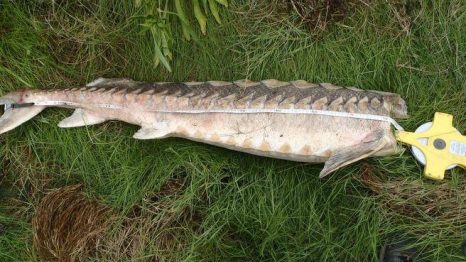
New turbines just as lethal as Annapolis turbines
Much more needs to be said and written about the testing of tidal stream turbines in Minas Passage. Graham Daborn, emeritus professor at Acadia University, wrote an Opinions article under this heading (Oct. 15), but without the “more”. Unfortunately much of what has been said and written comes from the proponents of tidal power. And they have obscured the facts about what the physical properties of their machines can do to living organisms. People living around Minas Basin still talk about what happened when the first turbine was installed at the FORCE (Fundy Ocean Research Center for Energy) experimental site in 2009. Two humpback whales suddenly showed up on Minas Basin beaches with large gashes in their bodies. That turbine suddenly stopped working and when it was lifted in 2010 blades were broken. What broke them? Annapolis was installed as a test turbine and 31 years later it is still spinning, still killing fish (five sturgeon and counting this year). There never was an environmental assessment. Read the op-ed here 09:43


































